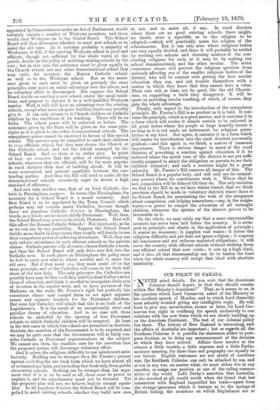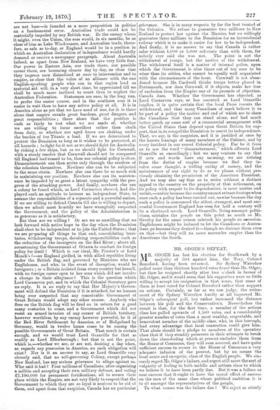OUR POLICY IN CANADA.
"MEYER mind details. Do you wish that the American 11 Colonies should depart, or that they should remain within Her Majesty's dominions?" That, as it seems to us, is. the question which Lord Carnarvon asked of the Ministry in his excellent speech of Monday, and to which Lord Granville- most adroitly avoided giving any intelligible reply. He will have to give one, nevertheless, sooner or later, for Lord Car- narvon was right in confining his speech exclusively to our. relations with the new State which we are slowly building up. on the American Continent. The test of our colonial policy- lies there. The history of New Zealand is interesting, and: the affairs of Australia are important ; but as regards all the- Southern Colonies it is poisible for statesmen either to post- pone decision, or to delay any announcement of the decision, at which they have arrived. Affairs there involve at the utmost a little trouble, a little expense, and a little Parlia- mentary sparring, for there time and geography are equally in.. our favour. English statesmen are not afraid of maritime. war, the Southern Colonies can only be attacked by sea, and at sea in any war, no matter what, we must either win at any sacrifice, or resign our position as one of the ruling commu- nities of the world. Lof-d Derby's assertion that Australia, if she revolted at all, would revolt when she found that her connection with England imperilled her trade—apart from the strange ignorance which it betrays as to the springs of British feeling, the occasions on which Englishmen are or are not base—is founded as a mere proposition in politics on a fundamental error. Australian trade could not be materially impeded by any British war. Be the enemy whom it might, even the Union, the seas would, in six months, be as clear of him as Lake Wiudermere, and Australian trade, there- fore, as safe as to-day, or England would be in a position in which an Australian declaration of independence would hardly demand or receive a newspaper paragraph. About Australia indeed, as apart from New Zealand, we have very little fear. Our power in Eastern Asia, our trade there, our possible career there, are becoming clearer day by day, so clear that they impress men disinclined at once to intervention and to empire, so clear that the value of an alliance with the one English-speaking people who can in that region lend us material aid will, in a very short time, be appreciated till we shall be much more inclined to court than to neglect the Australian Federation. Statesmen are sure, in the long run, to prefer the easier course, and in the southern seas it is easier to wait than to have any active policy at all. It is in America alone as yet that we have need of one, for it is there alone that empire entails great burdens, great dangers, and great responsibilities ; there alone that the position is such as fairly to test what we are made of, whether we are willing to incur sacrifices rather than skulk from duty, or whether our aged knees are shaking under the burden of too Titanic a load. If we are determined to protect the Dominion as long as it wishes to be protected, at all hazards ; to fight for it not as we should fight for Australia, by risking a few ships, but as we should fight for Cornwall, with a steady resolve that Cornwall should not be conquered till England had -ceased to be, then our colonial policy is clear. Dismemberment can then arrive only through the resolves of the colonists themselves. Nowhere else can ive be subjected to the same strain. Nowhere else can there be so much risk in maintaining our position. Nowhere else can its mainten- ance be impeded by so great a latent sympathy with the pro- gress of the attaoking power. And finally, nowhere else can a colony be found which, as Lord Carnarvon showed, had dis- played such an aptitude to become an independent State, to assume the responsibilities of a separate and a powerful nation. If we are willing to defend Canada till she is willing to depart, then we admit most heartily we have wrongfully suspected the Government, and the policy of the Administration is as generous as it is satisfactory.
But then are we willing Or are we so unwilling that we look forward with active hope to the day when the Dominion shall elect to be independent or to join the United States ; that we are preparing all things to that end, consolidating terri- tories, withdrawing troops, devolving responsibilities such as the reduction of the insurgents on the Red River ; above all, accustoming the Government of Ottawa to conduct its foreign policy for itself ? Which is our ideal, Mr. Forster's or Lord Monek's I—an England girdled, in with allied republics living under the British flag, and governed by Ministers who are Englishmen, and who, in the event of disruption, would be foreigners ; or a Britain isolated from every country but herself, with no foreign career open to her sons which did not involve a change in their allegiance ? This is the question which Lord Carnarvon put, and to which the Colonial Secretary gave no reply. It is no reply to say that Her Majesty's Govern- ment will defend the Dominion if it is attacked, for no human being ever suspected that any conceivable Government of Great Britain would adopt any other course. Anybody who fires on the British flag will be fired on in return for a good many centuries to come, and a Government which did not resist an armed invasion of any corner of British territory, however worthless, by any enemy however powerful, be it of the Red River Settlement by America, or of Heligoland by Germany, would in twelve hours cease to be among the possible Governments of Great Britain. That much is certain enough, and we would trust Lord Granville for that as readily as Lord Ellenborough ; but that is not the point, which is,—whether we are, or are not, desiring a day when, as regards any possession in America, no such obligation will exist Nor is it an answer to say, as Lord Granville very cleverly said, that no sell-governing Colony, except perhaps New Zealand, has any serious grievance to allege against us.
Who said it had Four millions of Canadians, after organizing a militia and accepting their own military defence, and voting £1,100,000 for permanent fortifications, all to secure their place within the Empire, are not very likely to suspect that the Government to which they are so loyal is anxious to be rid of them, and apart from that suspicion, Canada has no particular grievance. She is in many respects by far the best treated of the Colonies. We refuse to guarantee two millions to New Zealand to protect her against the Maories, but we willingly guarantee three millions to the Dominion for an intercolonial railway which is to make it easier for her to be independent. And finally, it is no answer to say that Canada is rather safer without 4,000. or 5,000 red-coats than with them, for nobody ever said she was not. The point is not the withdrawal of troops, but the motive of the withdrawal. The withdrawal itself is a matter of internal police, upon which the Government is nine times out of ten sure to be wiser than its critics, who cannot be equally well acquainted with the circumstances of the hour. Cornwall is not aban- doned because Mr. Cardwell thinks troops better placed in Portsmouth, nor does Cornwall, if it objects, make her fear of exclusion from the Empire one of its grounds of objection. Canada does. Whether the Government has objected, as Lord Carnarvon says, or has assented, as Lord Granville implies, it is quite certain that the local Press resents the withdrawal, and that many Canadians of mark believe it to be part of a policy the motive and end of which are to show the Canadians that they can stand alone, and had much better patch up some sort of a commercial arrangement with the United States than depend upon Great Britain for sup- port, that is, to compel the Dominion to assert its independence. That, we say, is the suspicion, and it is justified at once by the known leanings of many members of the Cabinet, and by every incident in our recent Colonial policy. Far be it from us to use the word " dismemberment," which affronts Lord Granville so exceedingly ; but we may venture to say that if acts and words have any meaning, we are retiring from the duties of empire because we find they in- volve some thought, a trifling outlay of money, and the maintenance of our right to do as we please without prem viously obtaining the permission of the American President. And we may also say that so to retire without a distinct appeal to the country on the propriety of that retirement, on its policy with respect to its dependencies, is most unwise and unfair,—unfair because the country cannot retrace its steps when once such a policy has been carried out, unwise because the day such a policy is announced the ablest, strongest, and most suc- cessful Government England has seen for half a century will be a shattered wreck. Lord Granville, living amongst politi- cians, mistakes the people on this point as much as Mr. Greeley for the same reason mistook his people on secession. Englishmen might be induced to let the Canadians or Austra- lians go because they desired it—though we distrust them even on that—but they will no more surrender empire than the Americans the South.

































 Previous page
Previous page